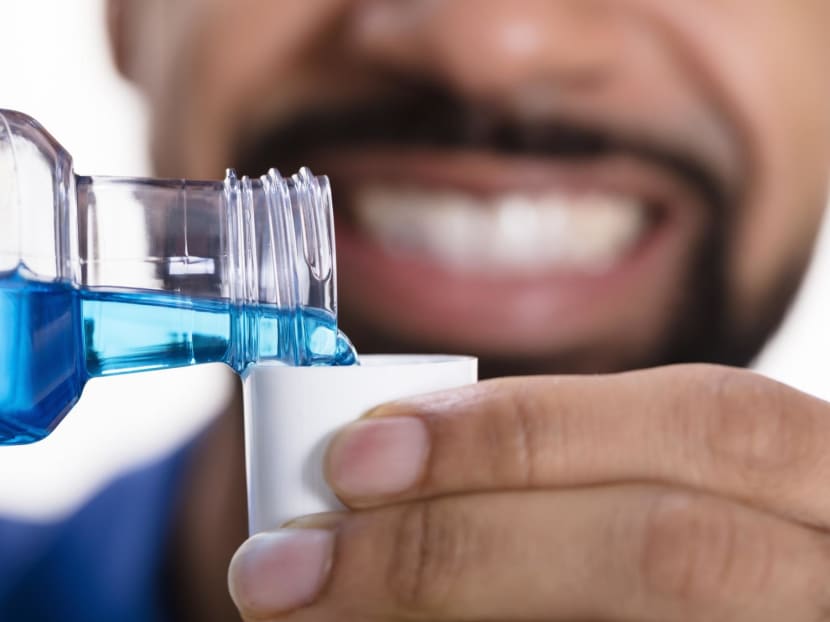One simple action to reinforce your oral hygiene routine
Less plaque, healthier gums and fresh breath – all in 30 seconds.

Reach otherwise hard-to-clean areas in your mouth with a gargle. Photos: Shutterstock
For all the brushing and flossing, isn’t it odd that a study conducted by Singapore’s Health Promotion Board revealed that 85 per cent of Singaporeans still have cavities and gum problems?
Clinical director of Asia Pacific Dental Centre, Dr Kelvin Chye, shared that the likely reason is that brushing and flossing are not enough. “When it comes to maintaining good oral hygiene, there’s more you need to do than just brushing or flossing your teeth,” the dental surgeon with 17 years of experience revealed. “Our teeth make up only 25 per cent of our mouth and clinical research has shown that brushing teeth only removes 30 to 53 per cent of plaque. There may be some residual plaque in areas you can’t reach, which is why a whole mouth clean can only be achieved by brushing, flossing and rinsing with a suitable mouthwash.”
As part of World Oral Health Day on Mar 20, Listerine hopes to encourage people to rethink their oral hygiene routine and discover the difference this essential step will give. It joins a growing number of dental and health experts who recommend using mouthwash to give your mouth the deep clean it deserves.
A SWISH OF ADDED PROTECTION
Focusing on the teeth alone and ignoring other surfaces within the mouth in which plaque and bacteria can accumulate may cause long-term issues like gingivitis, explained Dr Ashita Bhatia, oral care scientist from Johnson & Johnson.
“Mouthwash that contains powerful anti-bacterial ingredients such as essential oils have the ability to attack plaque and kill bacteria in the whole mouth and not just on the teeth,” she shared. Listerine taps into the natural properties of essential oils, including anti-bacterial oils like thymol, eucalyptol, menthol and methyl salicylate, to effectively target and destroy germs while freshening the breath.
Added Dr Chye: "Essential oils are non-ionic and do not adversely interact with ions that may be found in dentifrices and other oral hygiene products." This means that there is no need to spread out brushing your teeth and rinsing with mouthwash.
He shared that some groups have a more urgent need to adopt the habit of using mouthwash. Smokers, for example, have an increased risk of gum disease by up to 85 per cent, and patients with diabetes also run the risk, with nine of 10 experiencing oral problems. Others worth taking note are those with braces, implants and bridges.
These vulnerable demographics will benefit from a mouthwash routine because it “can penetrate the plaque biofilm to lower the level of live bacteria in plaque colonies left behind by brushing and flossing”, he explained.

THIRTY SECONDS OF DIFFERENCE
There are many myths that surround mouthwash. Do you dilute your mouthwash with water? Not a great idea. As with brushing, rinsing with water washes away some of the protective layer imparted by the routine. “It is best not to rinse with water after using mouthwash because it can decrease the effectiveness,” Dr Bhatia revealed. If you are doing so because the taste is too intense, the doctor recommends picking a milder version.
Aren’t all mouthwash the same? According to Dr Bhatia, no. “Many mouthwashes contain additional ingredients like fluoride (anti-cavity), zinc chloride (anti-tartar), polyphosphates (whitening) and potassium nitrate (for sensitivity) in different concentrations with varying efficacy.”
The scientist also shared that one should choose a mouthwash that has demonstrated its safety and efficacy in clinical studies – something Listerine has achieved, with over 116 years of published evidence.
How about the alcohol in mouthwash? Isn’t that unsafe? “Alcohol is not an active ingredient in mouthwashes but rather used to solubilise the product’s active ingredients in a water base,” explained Dr Bhatia. “Alcohol-containing mouthwashes have been evaluated by the FDA to be safe and effective.”
For those who prefer alcohol-free solutions, Listerine's Total Care Zero would be the right fit as it is formulated without alcohol. It is also the most advanced mouthwash solution in Listerine's portfolio. It aims to deliver six solutions – protect healthy gums, prevent cavities, reduce plaque, freshen breath, keep teeth naturally white by reducing new tartar build-up, and kill 99.9 per cent of germs that cause bad breath, plaque and gum problems.
Others who might want more of a taste in their mouthwash can opt for other mouthwash solutions in Listerine's vast portfolio. Listerine Cool Mint, for example, is great for those who like minty flavours and want a full blast of freshness. Others may want to tap into fruity flavours like those in Listerine Sakura & Peach Zest.
ADD A BREATH OF FRESH AIR
Adding a mouthwash could be particularly important now, given how the pandemic may have exacerbated bad oral hygiene.
With stay home habits building up, one might have been complacent with brushing and flossing routines, even skipping them altogether on some days. And with more time in front of screens, frequent snacking has crept in, which may compound oral health issues. Lockdowns and restrictions have also affected dental services, and some may not have gotten back to their regular twice-a-year dental visits.
“Oral health is a gateway to overall health,” Dr Chye reminded. “Oral biofilms may play a role in diseases beyond that of oral health.” Adding mouthwash to your routine can work as a beneficial layer of protection. After all, it just takes 30 seconds.
A healthier mouth starts with a swish of Listerine.






